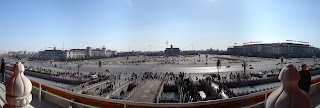I am sure that many of you have been hearing news about the unrest in China's western region of Xinjiang. Take a few minutes to read this new post on the events that led to the violence and the history of the Uighur people in China.
 Who are the Uyghuars/Uighurs?
Who are the Uyghuars/Uighurs?The Uighurs are Muslims living in western, China. Officially, the region is named Xinjiang, meaning “new territory,” but many Uighurs prefer to call it by its more controversial name, Uyghurstan or East Turkistan. Not only do Uighurs have a distinctly different appearance from Han Chinese, but they also have their own Turkic language and unique culture.
Uighurs declared independence from China in the early part of the 20th century, but they soon found their state brought under complete control of the Chinese government in 1949.
Chinese officials claim that “Uighur militants have been waging a violent campaign for an independent state by plotting bombings, sabotage and civic unrest." Since the 9/11 attacks in the U.S., this characterization has only intensified.
The Uighurs:
http://news.bbc.co.uk/2/hi/asia-pacific/7540636.stm
What happened?July 5- A small number of Uighurs - Muslim inhabitants of Xinjiang region - gathered in the provincial capital, Urumqi, to protest. A couple of weeks ago, two Uighuars died in a brawl that was suspected to have been against ethnic Han Chinese in Guangdong province. This led to discontent within the Uighur community and a strong desire to seek justice.
-Uighur protests spread across the city where Han Chinese account for ¾ of the population
-Uighurs trampled through Urumqi, attacking Han Chinese, setting cars on fire and destroying stores.
July 6- some Chinese officials blamed Rebiya Kadeer, an exiled Uighur leader, for inciting the Uighar people to violently protest. She responded with an official statement denying the claims (
http://axisoflogic.com/artman/publish/Article_56237.shtml)
July 7 – a death toll of 156 and more than 1,000 people injured is confirmed by Chinese officials
-groups of Han Chinese armed with homemade weapons take to the streets to seek revenge
-they smashed shops and encountered groups of Uighurs
-the riot police stepped in and imposed a curfew running from 9pm tonight until 8am Wednesday morning
timeline:
http://news.bbc.co.uk/2/hi/asia-pacific/8138866.stm
What led to the violence?As one of the few majority Muslim areas in China, Uighurs often feel suppressed by the Chinese government and the dominant Han population. Uighurs assert that their "religious, commercial and cultural activities have been gradually curtailed by the Chinese state.” Furthermore, Beijing has been accused of arranging mass immigration of Han Chinese to Xinjiang to slowly decrease Uighur influence. “Han Chinese currently account for roughly 40% of Xinjiang's population, while about 45% are Uighurs.” Whether or not the claims against Beijing are true, it is certain that the small Uighur population does not always fit in with the rest of China.
A protest on July 5 in Urumqi, the region’s capital, turned violent with Uighurs and Han Chinese ruthlessly attacking one another in the streets.
The BBC reports that Chinese authorities blame Xinjiang separatists based outside China for the unrest, while Uighur exiles said police had fired indiscriminately on a peaceful protest calling for an investigation into the deaths of two Uighurs in clashes with Han Chinese at a factory in southern China.
To find out more: the
BBC, MSNBC, The National PostI want to hear your comments on the Uighur's situation in China. Were the actions taken by the Chinese state legitimate? Do you think they went too far or did they have no choice but to mitigate the situation through force?










